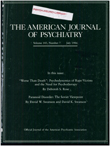Transient cognitive disorders (delirium, acute confusional states) in the elderly
Abstract
Transient cognitive disorders (delirium and pseudodelirium) are highly prevalent among the elderly, especially those with brain damage. Delirium is a common feature of physical illness or drug intoxication in elderly patients and requires prompt medical attention. While potentially reversible, delirium may herald death. Pseudodelirium may be induced by psychosocial stress or accompany a functional mental disorder. Transient cognitive disorders must not be confused with dementia, a chronic syndrome. The author discusses clinical features, etiology, pathogenesis, diagnosis, and treatment of delirium and related transient disorders of cognition in the elderly.
Access content
To read the fulltext, please use one of the options below to sign in or purchase access.- Personal login
- Institutional Login
- Sign in via OpenAthens
- Register for access
-
Please login/register if you wish to pair your device and check access availability.
Not a subscriber?
PsychiatryOnline subscription options offer access to the DSM-5 library, books, journals, CME, and patient resources. This all-in-one virtual library provides psychiatrists and mental health professionals with key resources for diagnosis, treatment, research, and professional development.
Need more help? PsychiatryOnline Customer Service may be reached by emailing [email protected] or by calling 800-368-5777 (in the U.S.) or 703-907-7322 (outside the U.S.).



